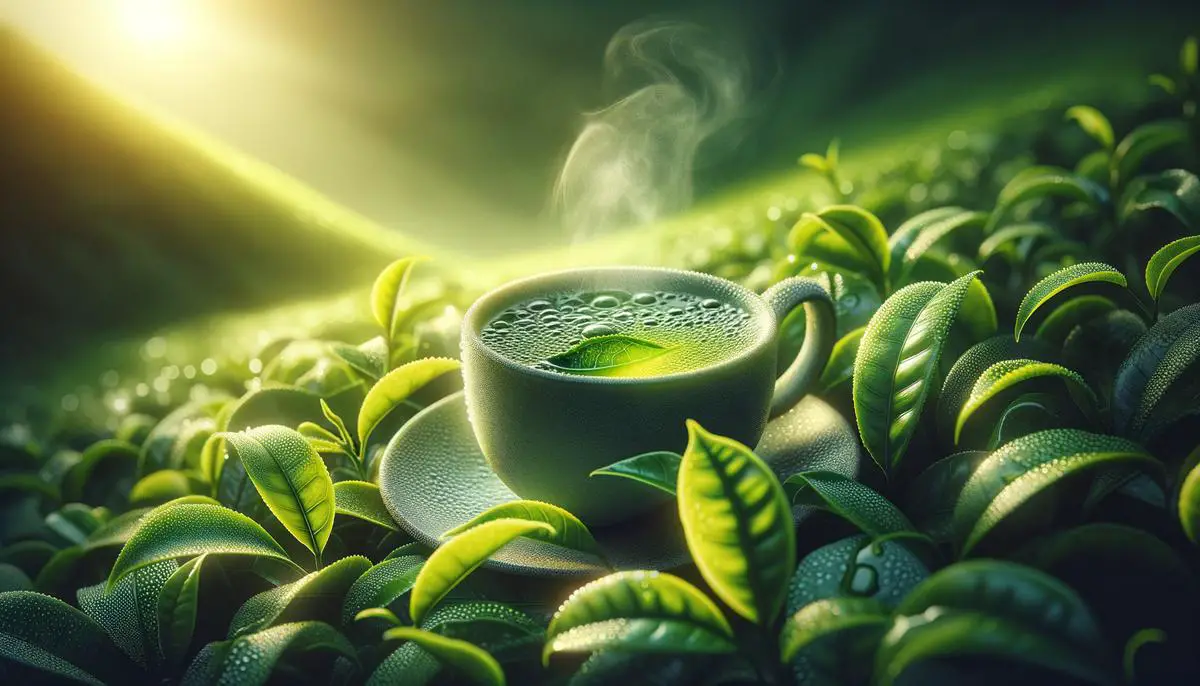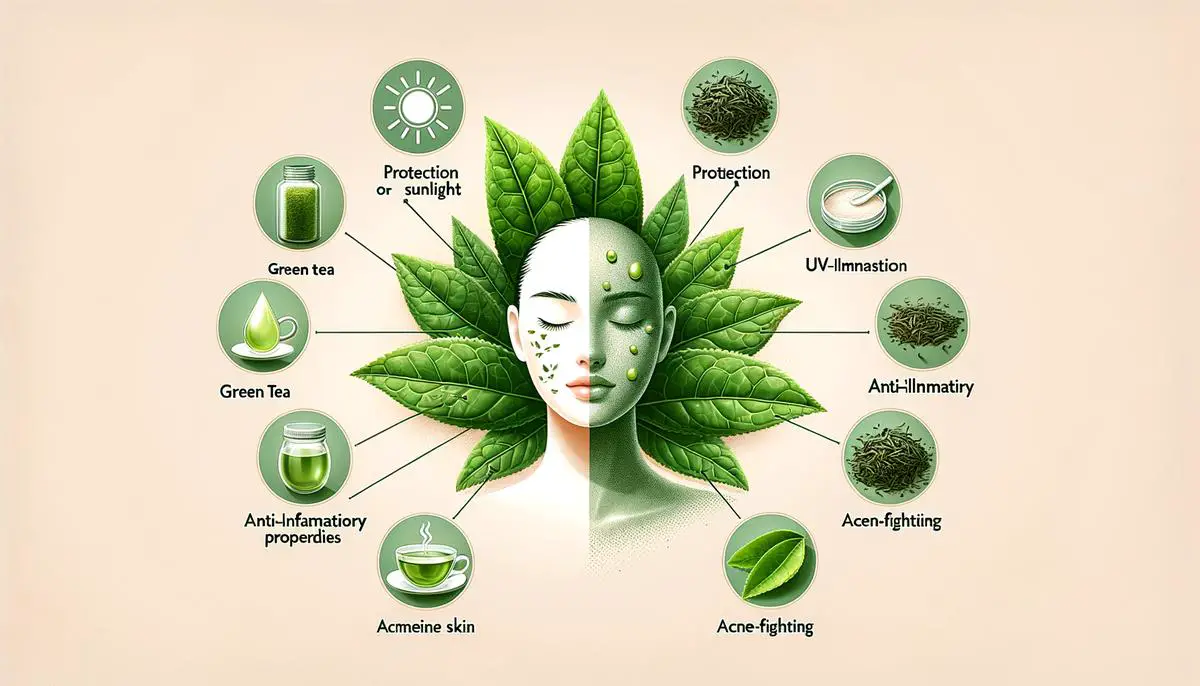Green tea, a simple beverage steeped in history and tradition, has woven its way into the fabric of daily health rituals around the globe. Its reputation as a healthful drink rests on a foundation of scientific research and centuries of anecdotal evidence. This discussion casts a light on the myriad ways green tea contributes to overall well-being, from its antioxidant prowess to its potential for aiding weight loss, enhancing skin health, and supporting mental alertness. Let’s gently pour over the reasons why this ancient brew continues to be a modern-day staple for those attentive to their health.
Green Tea Antioxidants
Green tea earns its superhero status in the beverage world because it’s full to the brim with antioxidants known as catechins. Dive right into catechins, and you find they’re not just ordinary antioxidants. They’re like your body’s own personal team of superheroes, fighting off the villains – free radicals that wreck havoc in your body, leading to aging and disease. The most powerful catechin found in green tea is EGCG (epigallocatechin gallate), which stands tall among antioxidants for its ability to fend off cellular damage and keep the cells dancing in your body.
Think of free radicals as those uninvited guests at a party, causing trouble and upsetting the vibe. Free radicals are unstable atoms that can damage cells, leading to illness and aging. Here’s where green tea steps in: its antioxidants neutralize these party crashers, potentially lowering your risk of some chronic diseases. Imagine your cells throwing a party where antioxidants keep the peace, ensuring everything runs smoothly, protecting against those seeking to break down what you’ve built.
But how exactly do these antioxidants in green tea do their heavy lifting? It’s not merely a matter of them floating around willy-nilly; they actively engage in a defensive strategy. By donating electrons to free radicals, antioxidants stabilize them, basically calming them down before they can cause more damage. This process can significantly curb your risk for chronic conditions like heart disease, stroke, and even some cancers.
Moreover, the level of antioxidants in green tea can surpass that of other fruits and veggies known for their high antioxidant content. This magic brew doesn’t just stop with protecting your cells. It boots up your body’s own antioxidant defenses. That’s right! Green tea amps up the production of detoxifying enzymes which provide an additional layer of protection against cellular damage.
In summary, if improving your health could be as simple as sipping on a warm, soothing beverage, wouldn’t you brew a pot? Green tea makes a compelling case for being one of the most straightforward steps you can take towards better health, thanks to its arsenal of antioxidants like catechins and particularly EGCG. It’s not just a tea; it’s a delicious daily ritual that showers your cells with the love and protection they deserve. Whether you’re looking to fight off free radicals, reduce your risk of chronic disease, or just enjoy a soothing moment of zen, green tea wraps it all up in one comforting cup.

Green Tea and Weight Loss
Green tea has a knack for meddling in the body’s fat-fighting affairs, notably through enhancing metabolism. This process does a bit more than simmer down; it kindles the body’s ability to torch calories more efficiently. The narrative unfolds on the edge of scientific studies which suggest that regular consumption of green tea ups the ante on the metabolic rate, the pace at which the body converts food and drink into energy.
Beyond metabolism, the plot thickens. Green tea waves its magic wand over fat oxidation – the very process of breaking down fatty acids. It sends signals that are kinda like turning up the volume of your favorite tune on a jog – it gets you going faster and more effectively. Essentially, with green tea, the body becomes a bit more enthusiastic about using fat as fuel, nudging those stubborn fat deposits.
There’s a term tossed around in circles of those who take their scales as seriously as their morning brew, known as “thermogenesis.” It sounds fancy, but it’s just the body’s way of generating heat from digesting, absorbing, and metabolizing food. Green tea gives thermogenesis a slight nudge, thereby slightly increasing calorie burn even when you’re more sloth than squirrel.
What’s particularly intriguing is the role of not just any compound, but green tea’s poster child, EGCG, combined with a dab of caffeine. Unlike solo acts, this combination is more like a duet, working together to boost energy levels and potentially squeezing out a few extra moments of moderate physical activity stamina without you even realizing. Alright, no promises you’ll morph into a marathon runner overnight, but every little bit helps, right?
Indeed, it’s worth a mention that while green tea plays no favorites, the magnitude of its effects can be akin to a whisper rather than a shout for people depending on their genetic makeup. Some lucky ducks might see significant changes in body composition, while others notice subtler shifts. This character dynamic indicates that while green tea might not headline as a miracle solution, it earns its place as a noteworthy supporting character in the weight loss narrative.
Given that hydration is invariably linked to metabolism, switching up a soda for a refreshing cup of green tea adds to its repertoire not only a medley of metabolic benefits but also underscores the importance of making healthier lifestyle choices overall.
So, with science tip-toeing through the metabolic mechanics behind green tea’s weight loss claims, it comforts to know that this ancient elixir offers modern day benefits. Whether your aim is to shed some weight or simply keep your metabolic gears running smoothly, a daily dose of green tea might just add that spark. In the tapestry of weight management options, it stitches in its thread – not as the centerpiece but as an essential shade enriching the overall pattern.

Green Tea for Skin Health
Green tea extends its impressive resume into the realm of skin health, advancing beyond its metabolic and antioxidant achievements. Polyphenols, specifically those found in green tea, emerge as skin health champions. Their combat against acne stems from their antimicrobial properties. By tackling the bacteria responsible for acne means fewer breakouts. It’s like having a security guard at the door, keeping the troublemakers away from your skin.
Dermatologists point out that inflammation is a root cause of many skin woes, including redness and irritation. Green tea’s polyphenols have anti-inflammatory capabilities, acting like a soothing balm that calms stormy skin conditions. This can be especially beneficial for those with sensitive skin seeking relief.
Another feather in green tea’s cap is its ability to protect skin from environmental aggressors like UV rays and pollution. These elements can fast forward the skin’s aging process, but green tea polyphenols can shield skin cells from some of the damage. Imagine sunblock and a pollution mask; green tea does somewhat for your skin on a cellular level.
Researchers focus on Epigallocatechin gallate (EGCG) in green tea, which showcases its might in defending skin against harmful UV radiation. While not a substitute for sunscreen, EGCG supplements sun protection and aids in the fight against photoaging. Skin cancer studies have highlighted how green tea might play a role in reducing the risk, making it a noteworthy addition to sun protection regimes.
Pollution, another foe of healthy skin, leads to oxidative stress and accelerates aging. Green tea steps in again with its antioxidant power, creating a barrier against pollutants and minimizing their impact. Living in urban areas with higher pollution levels makes incorporating green tea into one’s skincare routine a smart move.
Experts often advocate for topical green tea formulations as an effective method to deliver these benefits directly to the skin. Whether in serums, creams, or facemasks, these products allow polyphenols to penetrate the skin’s surface, getting right into the thick of action against problems like acne and premature aging.
Conversations with dermatologists reveal anecdotal evidence of green tea’s benefits, but ongoing studies aim to quantify its effectiveness further. With emerging research supporting the anecdotal praise, the allure of green tea in skincare continues to grow.
In summary, green tea flaunts its versatility, proving it’s not just a beverage but a potent ally for skin health. Covering everything from acne and inflammation reduction to guarding against UV damage and pollution, green tea earns its place in the pantheon of skin superheroes. Transitioning from cup to cream pot, green tea’s journey from a beloved drink to a skincare staple signifies its universal appeal and efficacy.

Green Tea and Mental Wellbeing
Shifting the focus from physical to mental health reveals green tea’s fascinating role in enhancing mental alertness and possibly lowering stress levels. L-theanine, an amino acid exclusively found in tea leaves, alongside caffeine, creates a unique duo that significantly impacts brain function. Unlike the jolt of energy provided by coffee, the L-theanine and caffeine in green tea work together to improve cognitive function, promoting a more sustained and focused state of alertness without the common jittery side effects associated with high caffeine intake.
Studies have shown that L-theanine crosses the blood-brain barrier, where it influences the central nervous system directly. This interaction aids in increasing dopamine and alpha-wave activity in the brain, which contributes to a sense of calm and enhanced creativity. This calm alertness is a stark contrast to the sometimes abrupt spike in energy levels provided by other stimulants. By modulating aspects of brain function, green tea can help individuals achieve a greater level of focus and attention to detail, which is particularly beneficial during extended periods of study or work that require intense concentration.
The combination of L-theanine and caffeine can also have a synergistic effect on cognitive performance, improving speed and accuracy on cognitively demanding tasks. Such effects make green tea not only a pleasure to drink but also a potentially beneficial beverage for brain health. Indeed, these components of green tea may reduce the risk of developing neurodegenerative diseases such as Alzheimer’s and Parkinson’s Diseases by protecting neurons from damage and dysfunction.
Moreover, regular consumption of green tea has been linked to reduced stress and anxiety levels. The properties of L-theanine can influence serotonin and dopamine levels in the brain, which play an essential role in mood regulation. This suggests that incorporating green tea into one’s daily routine could provide a gentle yet effective way to manage stress and promote a more positive mood overall.
As people worldwide continue to seek natural ways to support their mental health and cognitive function, the properties of green tea present a compelling area of interest. By fostering an environment of calm alertness, aiding in concentration, and potentially lowering the risk of cognitive decline, green tea proves to be more than just a soothing beverage. It emerges as a supportive ally in the pursuit of mental well-being and cognitive health, highlighting the integral role of diet and natural substances in maintaining our mental health.
This ongoing examination into the benefits of L-theanine and caffeine found in green tea underscores a broader recognition of how natural compounds can support human health in multifaceted ways. As research delves deeper into these relationships between natural substances and cognitive function, it paves the way for developing more effective strategies for enhancing mental health in our daily lives, making green tea an invaluable component of a holistic approach to well-being.

In the landscape of health and wellness, green tea stands out not just as a beverage of choice but as a symbol of the gentle yet profound impact nature can have on our well-being. Among its many accolades, the ability of green tea to support mental alertness while potentially reducing stress levels underscores its role as more than just a drink; it’s a daily ritual that nurtures both body and mind. As we sip on this verdant elixir, we’re reminded of the simple, accessible steps we can take toward nurturing our health, making each cup a testament to the enduring power of green tea in enriching our lives.
